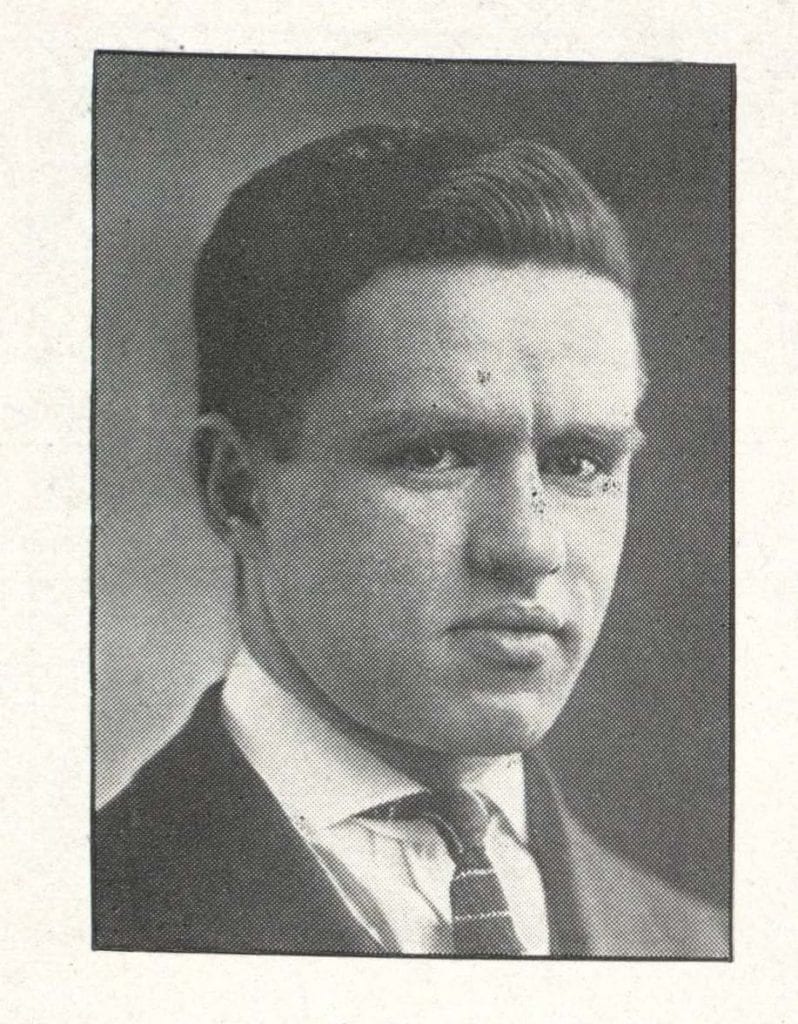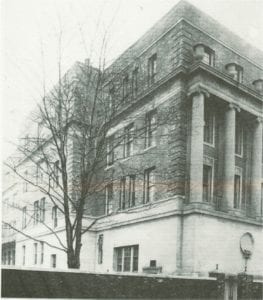Martin Duke
Mystic, Connecticut, United States
 |
| Maxwell Finland in the senior yearbook from the Harvard Class Album 1922. (Credit: HUD 322.04 page 181. Harvard University Archives.) |
Maxwell Finland (1902-1987) was a remarkable physician, teacher, and researcher in infectious diseases. His life began during the turmoil of the pogroms in Tsarist Russia and ended in the heady academic and medical surroundings of Boston, Massachusetts. It was a life well spent.
Whatever else may have prompted Frank and Rebecca Finland to leave the village of Zashkov in the Ukraine shortly after Maxwell (Max) was born,1 the pogroms against the Jews and the forced conscription of Jewish young men into the Tsar’s army were surely reasons enough for emigrating. Frank left first, arriving in the United States in 1902 and settling in Boston. Four years later, in April 1906, Rebecca followed with Max and his older brothers. Leaving from Liverpool aboard the RMS Carmania, she arrived in New York and joined her husband.1,2
The family lived at 353 Charles Street in Boston. Frank worked as a tailor.2 Max attended Boston English High School and graduated second in his class. He was accepted at Harvard College, received a Bowditch Scholarship and a Parmenter Scholarship, and graduated cum laude in 1922. His long association with Harvard had begun.3,4
A student at Harvard Medical School from 1922 to 1926, Finland was exposed to great teachers such as Hans Zinsser in microbiology and Milton Rosenau in preventive medicine and hygiene.4 On December 28, 1925, he received his final papers as a naturalized citizen of the United States.1
After graduating from medical school, Finland was, in rapid succession, intern and then pneumonia resident at the Boston City Hospital, and in 1929 was asked to join the Thorndike Memorial Laboratory, a part of the Harvard unit at the hospital. He went on to serve as director of the Harvard medical services at the Boston City Hospital, and in 1963 was appointed George Richards Minot Professor of Medicine on the Harvard Faculty of Medicine and named director of the Thorndike Memorial Laboratory, succeeding Dr. William Castle.4,5 In later years, he would write how he
“crept slowly up the academic ladder in the Department of Medicine, one rung at a time, pausing a little longer than usual on some, and finding an extra one inserted here and there as if to make sure of my footing . . . Whether because of inertia, or through complacency or contentment, once having come to the Boston City Hospital, I’ve kind of got anchored here. Practically all of my clinical and investigative work, as well as the teaching assigned to me, has been done at the Thorndike Memorial Laboratory and on the Second and Fourth Medical Services, which together constitute the Harvard teaching unit in medicine at the City Hospital.”5
 |
| The Thorndike Memorial Laboratory at Boston City Hospital, 1923. (Credit: Center for the History of Medicine in the Francis A. Countway Library of Medicine, Harvard Medical School.) |
Not to be overlooked was Finland’s devotion to his patients at the hospital and his mentoring of many physicians who would themselves later become well known infectious disease specialists. A former fellow of his later wrote, “Dr. Finland . . . took a personal interest in the well-being and academic career of the fellow. Max was a bachelor, so the fellows were his family. The fellows looked at Dr. Finland as his or her personal father.”3
Max Finland’s career and many contributions to the field of infectious diseases, ranging from his early studies on treating pneumococcal pneumonia with type-specific antiserum6 to his later work with antimicrobial drugs, have been well-reviewed by the Nobel laureate Frederick C. Robbins4 and by Jerome O. Klein,3 a noted pediatric infectious disease specialist trained in Finland’s laboratory at the Thorndike.
Finland was strongly critical of drug companies for marketing fixed-dose antibiotic combinations. His testimony before government agencies that these products led to the indiscriminate use of antibiotics, to “shotgun therapy” by doctors, and to the emergence of resistant strains of bacteria supported their withdrawal from the market.7
Finland received many awards and honors, including the Kober Medal of the Association of American Physicians, the Philips Award of the American College of Physicians, the Bristol Award of the Infectious Diseases Society of America, and the Sheen Award of the American Medical Association.4 In 1963, he became the first president of the Infectious Diseases Society of America. Since 1988 the National Foundation for Infectious Diseases has presented an annual Maxwell Finland Award for Scientific Achievement.3
In 1968, Finland retired and moved to the Channing Laboratory headed by Dr. Edward Kass. There was no let up on his research and he continued to write and mentor the fellows.4 Together with Dr. William Castle he compiled and wrote a massive three-volume history of the Harvard Medical Unit at Boston City Hospital and the Thorndike Memorial Laboratory.8 He was a tireless worker and his interests outside medicine seemed few. He did, however, attend the Saturday evening series of the Boston Symphony Orchestra and enjoy the Theatre Guild performances, where he met and entertained classmates and colleagues.9
In 1987, Finland was hospitalized at the Faulkner Hospital in Boston. He died there on October 25 from an acute myocardial infarction.10 On the memorial gravestone at his burial site in the Chevra Thilim of Malden Cemetery in Everett, Massachusetts, written partly in Hebrew and in English, are his name, the date of his death, and his father’s name. He once wrote about himself: “On the whole, it has been a busy life that has kept this bachelor pretty well occupied. And for one who started literally from scratch, it has been quite satisfying and rewarding.”9
References
- Citizenship Papers: National Archives and Records Administration (NARA); Washington D.C.; NAI Number: M1368.
- Thirteenth Census of the United States: 1910 Population. Massachusetts, Suffolk County, Boston City, 15th April.
- Klein JO. Maxwell Finland: A Remembrance. Clinical Infectious Diseases 2002;34: 725-9.
- Robbins FC. Maxwell Finland: March 15, 1902-October 25,1987. In Biographical Memoirs. National Academy of Sciences. 1999;76:103-113.
- Harvard College (1780- ). Class of 1922. Twenty-fifth anniversary report, © 1947. Page 325. HUD 322.25, Harvard University Archives. (Courtesy of the Harvard University Archives. Reprinted by permission from the Harvard Alumni Association Class Report Office.)
- Finland M. The serum treatment of lobar pneumonia. N Engl J Med 1930; 202: 1244-7.
- Impartial Tests of Drugs Sought – Harvard Expert Urges Panel to Evaluate Products. New York Times, Tuesday, September 13, 1960.
- Finland M, Castle WB. The Harvard Medical Unit at Boston City Hospital. Charlottesville: Distributed by University Press of Virginia for Francis A. Countway Library of Medicine, Harvard Medical School, Boston. 1982-1983.
- Harvard College (1780- ). Class of 1922. Fiftieth anniversary report, © 1972. Page 175. HUD 322.50. Harvard University Archives. (Courtesy of the Harvard University Archives. Reprinted by permission from the Harvard Alumni Association Class Report Office.)
- Maxwell Finland: Death Certificate, issued by Registry Division of the City of Boston, County of Suffolk, Massachusetts.
MARTIN DUKE, MD, FACP, graduated in 1954 from the New York University School of Medicine in New York City. He was in private practice in cardiology in Manchester, Connecticut from 1963 to 1993, served terms as Director of Medical Education and Chief of Cardiology at the Manchester Memorial Hospital, and held a teaching appointment at the University of Connecticut School of Medicine. He is the author of two books and numerous medical articles.
Summer 2020 | Sections | Infectious Diseases

Leave a Reply